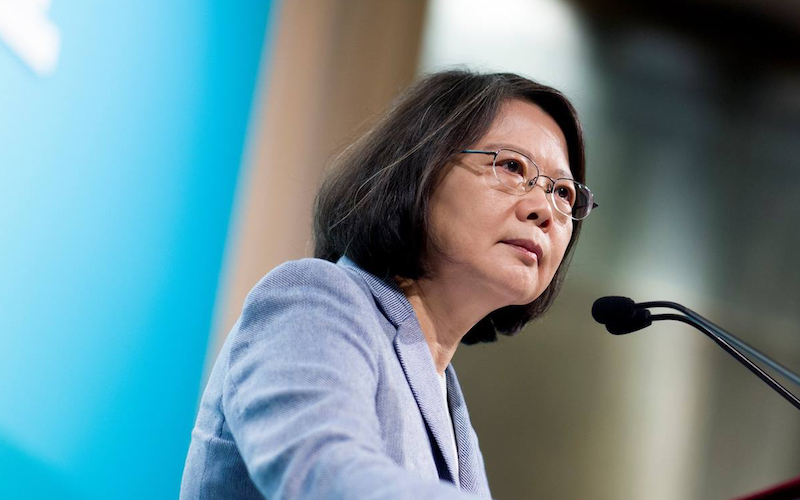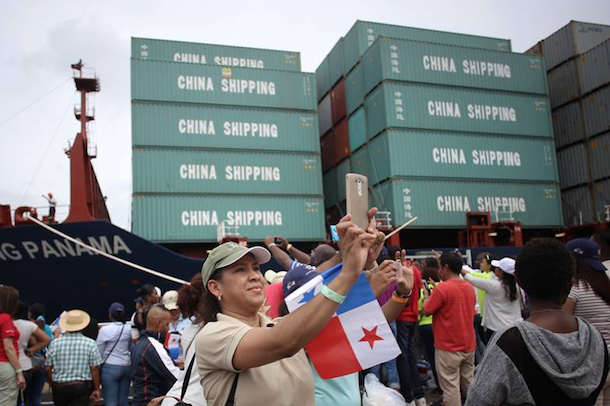
Panama Ditches the Sun Bear, Moves toward the Dragon
In just one year after taking office, the Tsai administration has seen two of its oldest allies cut diplomatic ties with Taipei while establishing a new one with Beijing. Interestingly, such ties were severed after a few months of assurances of strengthened friendship. The governments in Beijing and Taipei insist that countries cannot maintain official diplomatic ties with both of them concurrently. China again regards Taiwan as a breakaway province which needs to be taken, if necessary by force. It has therefore intensified its pressure on Taiwan since May 20, 2017 when Taiwan’s new president failed to officially acknowledge the “92 Consensus,” a cryptic version of the “One China” principle. This has even led to China suspending the cross-strait communication between Beijing and Taipei. As recent as December 2016 and June 2017, two of Taipei’s long-standing allies – Panama and Sao Tome and Principe ceded diplomatic ties with the Island and flocked to Beijing.
As Taipei keeps decreasing in its international space, Beijing continues to expand. Could it be that the strong will always have their way while the weak continue to suffer the consequence? Is it a neoclassical relative power advantage that has played so well for Beijing?
Panama’s announcement comes after Sao Tome and Principe switched camps from Taipei to Beijing in December 2016. Realist basic argument is that state’s interest coupled with power is of primacy to every country and its leaders. Neoclassical realism adds that a state’s foreign policy outcome is its response to systemic level factors, which have been intervened by its domestic or intervening variables. Thus, the FP trajectories of states become the results of the interaction between the systemic level factors and the intervening variables (i.e. domestic factors). The proponents, Gideon Rose, Taliaferro, Zakaria, Lobell and others further explain that the mode and veracity of the response is dependent on each state’s relative power capability, that is, the state’s political/international influence or status, economic power, military capability or hard power and even the perception of such international status by its leaders.
Suffice to say that if one state has much international recognition, status, economic power/influence and military richness, it stands a better chance of acting in a more vociferous manner and achieve greater goals than another whose relative power capability is less, especially when the two are in competition. Neoclassical realist explanation also means that a state’s intervening variables or domestic factors may either be a bane or boon in its response to a change in the global political system or the systemic level. So, in a state where bureaucratic impediments are high its response to the systemic level change may not be as swift as one whose bureaucratic systems are less cumbersome. For example, Chinese companies often outbid Indian companies in their bid for oil blocks in West Africa because China’s political system somehow allows for less bureaucratic process and has greater relative power capability than India.
Raj Verma’s comparative study of Chinese and Indian oil companies bidding for oil blocks in West Africa establishes that “Chinese NOCs [national oil companies] are preferred as partners relative to Indian oil companies in West Africa” because China’s economic muscle and membership in the United Nations Security Council (UNSC) with veto power empowers it to establish healthier diplomatic relations with countries in West Africa which to a large extent gives the Chinese NOCs an edge over Indian oil companies. In other words, the difference in the economic and political power of China and India in an anarchical international system tilts in favour of China and rational political leaders are more likely to have concordat with China. In effect, the relative power capability of a state influences and constrains its position in the anarchical international system.
In a related vein, China, a member of the International Monetary Fund (IMF), World Trade Organization (WTO), the World Bank, UNSC, pioneer of Asian Infrastructure Investment Bank (AIIB), ‘Belt and Road’ initiative, member of BRICS and the like with its ever increasing global influence amidst economic briskness, has the advantage of enticing both democratic and non-democratic states to its stakes. It also has the opportunity of attracting small powers, middle powers and even great powers to side with its visions or at least be more receptive towards its agenda as far as the struggle for global space between Beijing and Taipei is concerned. The traditional realists’ assertion of state’s interest first and neoclassical addition of relative power advantage seem to be playing the cards for Beijing. States will continue to pursue their interests at the detriment of values and ideological bonds.

In 2003, the world was shocked to hear President George W. Bush state categorically that “The United States policy is one China” and also opposed to Taiwan’s independence. He further cautioned both Beijing and Taipei to respect the status quo. This came after the president had announced in 2001 that he would “do whatever it takes” to defend Taiwan. President Trump had to backtrack on his own words of renegotiating terms on Taiwan’s situation with China after he had made a political and administrative blunder (so to say). Nelson Mandela shocked the world when in 2006 he announced plans of severing relations with Taipei in favour of Beijing. This came just two years after he had confidently avowed that South Africa would not turn its back on one of its long-standing and oldest friend and ally, Taiwan. The cases of Costa Rica, Malawi, Gambia and many others are all evidence of China’s increasing grounds vis-a-vis Taiwan’s decreasing popularity.
In an anarchical world, states’ behaviour may be uncertain but prudent in the eyes of their political leaders. Acting according to realist rational actor model, many of these states would prefer to align themselves with the ever increasing global power which has both the economic power and military capability coupled with strong international influence even if it hurts another state. A neoclassical explanation would be simply – all odds tend to favour China: its systemic status eclipses that of Taiwan; it has both the political and economic will and clout. Those states, therefore, find hope and prospects in their association with China rather than Taiwan. China is willing and able to exploit its relative power capability in the race much more than Taiwan.
In the case of Panama for instance, Juan Carlos Varela cited commercial reasons and added that “I’m convinced that this is the correct path for our country.” Accentuating this claim, Panama’s foreign minister de Saint Malo also expressed hope that the newly established ties would lead to trade, investment and tourism opportunities. To her, the switch will provide a better opportunity for “exporting more goods from Panama to China.” In acknowledgement of the neoclassical realists’ argument, Taiwan’s government gives up on any competition with Beijing in this case, thus, Taipei prefers not to wage any “diplomatic money game” with Beijing on the Panamanian case. China’s political and economic might have indeed played to its advantage over Taiwan.
Since Malawi broke off diplomatic relations with Taiwan and officially recognized the People’s Republic of China (PRC) in 2008, China has provided financing for a number of high-profile projects in that country; the Lilongwe International Convention Center, the construction of a new parliament building and the Malawi University of Science Technology and the Karaonga-Chitipa Road. China continues to invest millions of dollars in developmental projects in many of the states which have cut ties with Taipei in its favour.
So far as China continues to gain strides both domestically and internationally, even the ‘custodians’ of liberal democracy like the US and the UK would prefer to either appreciate China’s ‘one policy’ clause or just stay aloof when it comes to matters of relating the game of state-to-state international politics. So long as great powers continue to collude with other great powers so far as the windfall is in their interest both small states and/or quasi-states will continue to be at the mercy of the ‘giants.’ It must be stated cautiously that Taiwan has a peculiar case and the issue is much more delicate and complicated. Indeed, even the UN does not recognize the Island as a state. Where the UN provides an extraordinary naming contortions which allow Taipei to participate in institutions and events like the World Trade Organization, World Health Organization and the Olympic Games, Beijing sometimes has the influence to halt it. The recent May 22-31 annual meeting in Geneva of the World Health Assembly saga is a case in point. Actually, where Taipei even participates in such meetings of international bodies as an observer, it is not without Beijing’s endorsement. The Australian meeting on conflict diamonds and the U.N. aviation agency conference in Canada in which both failed to recognize Taipei show how neoclassical realists’ relative power or systemic level status can be a boon to one state and a bane to another.
What has to be done under the circumstance? Should Taipei accept the status quo or reject it? This article does not take a ‘yes’ or ‘no’ position to these questions. Its focus is to raise thought-provoking queries and leave the decision-making process to the discretion of the leaders of both China and Taiwan.
Neoclassical realism contends that relative material power establishes the basic parameters of a country’s foreign policy; noting in Thucydides‘ formula, that ‘the strong do what they can and the weak suffer what they must.’ They further state that the perception of the political leaders and elites who actually make FP choices is very important. Furthermore, where those leaders and elites have the strength and structures of states relative to their societies, they are able to mobilise and extract enough resources to achieve foreign policy outcomes and vice versa. In this context, apart from China’s relative material power capabilities and international influence or status, its domestic political system equally allows it to mobilise and extract a large proportion of the national resource for its foreign policy agenda. Beijing’s aids, loans and other developmental projects as well as grants across the globe are obvious to all.
Interestingly, Taiwan itself has seen tremendous growth and development since its respect for and acceptance of the ‘One China’ policy or the ‘92 Consensus.’ Since the pro-independence Democratic Progressive Party came to power, not only its international space and/or influence has shrivelled but its economy too has suffered significantly. Today, only 20 countries have diplomatic relations with Taiwan, down from 30 in the 1990s. It is worth noting that in all of this, it is the people of Taiwan and China who are actually both Chinese that suffer the most not the leaders. It is also important to note that great powers are most likely to do what they can whereas the small and weak states would have to dance to their music in so far as international laws and historical records go in their favour. If even the UN and the US recognize the ‘One China’ policy, then the Dragon really has more room and clout to punch harder and the Sun Bear must be prepared to bear the brunt or concede and accept the status quo. If historical accounts and international laws attest that there is one China, then the leaders of both Beijing and Taipei should endeavor to bring sanity to the rocket straining relations.
Taipei has limited resources by comparison; its democratic institutions and structures make it a stronger society as compared to Beijing’s weak society and strong state. Therefore, the chances of Beijing mobilizing and extracting large proportions of the nation’s resources for foreign policy ends is higher than that of Taipei. This is evident in almost all the countries that have switched camps from Taipei to Beijing. In a prospects theory argument, those nations would prefer to sacrifice whatever binds them to a small island like Taiwan for a bigger and global giant – economically, politically like China. This is where opportunity cost and cause-benefit analysis become prime in states’ behaviour and international relations; the suspension of cross-strait communication is already having a toll on Taipei’s economy. The pressure on Taiwan isn’t fizzling out, and both flanks must play a cautious game to avoid a real catastrophe. Obviously, as argued by neoclassical realism, the relative power capability of Taipei constrains its position in the anarchical international system in the bout with Beijing.

